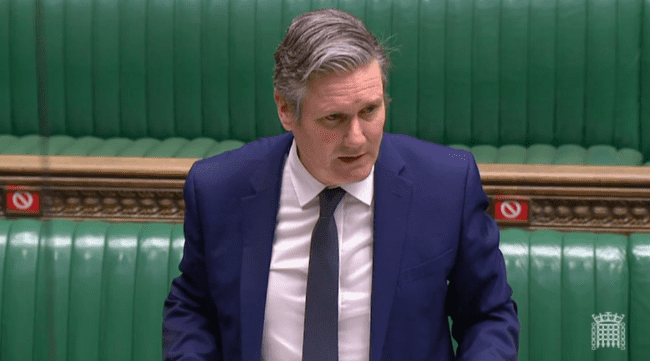Prime Minister’s Questions is usually a session where the PM defends his handling of one issue or another, under attack from the leader of the Opposition. But today’s session involved an attempt by Sir Keir Starmer to defend his approach to the Police, Crime, Sentencing and Courts Bill. Labour knows it has an exposed flank on this because the legislation contains such a large mix of different policies, and because it adopted its position of opposing the Bill rather late on.
The Labour leader devoted his questions to asking Johnson about how the government would respond to the aftermath of the murder of Sarah Everard, arguing that ‘sometimes a tragedy is so shocking it demands both justice and change’ and that ‘this must also be a watershed moment’. He said politicians needed to work together to tackle violence against women and girls, and continued in that serious, consensual tone.
Johnson had a relatively easy session
Johnson’s responses were more collegiate than usual. He told the Chamber that the concerns raised by Everard’s death were ‘wholly justified and understandable’. He called for a change in our culture that ‘understands that some do not feel that they are being heard’, and repeated assertions along these lines throughout his answers. He spoke with some passion about the need to end the sexism that breeds violent crimes such as rape. Both he and Starmer made repeated references to the ‘spirit’ of the exchanges and agreed to work together.
So why was this session covering a very serious, horrible issue also part of a series of tactics by Labour to try to defend itself politically? The answer is that Starmer will have come knowing that Johnson was going to attack him for voting against the Bill last night, and so he deployed the line that he’s been using since the whipping decision was announced on Sunday: that it doesn’t do very much at all for women and girls and that ‘it did say a lot more about protecting statues than it did about protecting women’.
This would make a bit more sense as a line if there weren’t also a Domestic Abuse Bill going through parliament at the moment – and indeed if Labour’s own attack lines about sentencing were fair. Johnson complained in one of his answers about the way the Opposition has misrepresented sentencing on rapes and vandalism of statues, and claimed that the legislation will beef up sentences for rapists. Later in the session, thanks to a planted question from a Conservative backbencher, he also criticised the party for tweeting last night that ‘under the Tories, rape has effectively been decriminalised’.
There are stronger lines of attack than this rather journalistic use of ‘effectively’. Starmer could have pointed to the chronic delays in the justice system which mean the rape victims who do see their case prosecuted will have to wait for years before it comes to court. This is much more directly as a result of the Conservatives than the prosecution rates, which are a matter for the Crown Prosecution Service and police. The Tories have overseen large cuts to the justice budget, as well as total dysfunction in the Ministry of Justice, including endless changes of Secretaries of State and regular clear-outs of more junior ministers.
There is also, of course, the fact that Starmer and his team decided to oppose the Bill because they consider the measures on protest to be disproportionate: a fear shared by some Conservatives too. Oddly, he didn’t go into much detail on that, and so Johnson had a relatively easy session of promising to work together, rather than having to justify much of what he is – or isn’t – doing.







Comments